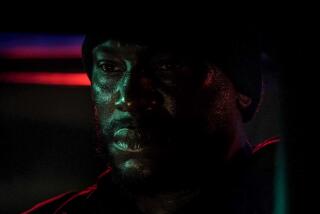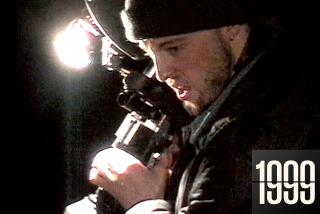Spreading the good word on ‘Machine Gun Preacher,’ ‘Dolphin Tale’
What passes for an epiphany in most movies is hardly profound — “The Hangover” guys remember where they lost somebody, or Green Lantern realizes that true power does not necessarily reside in his glowing ring. The transformations in “Machine Gun Preacher” and “Dolphin Tale,” both opening Friday, aim to be more spiritually and personally profound, and the filmmakers behind both new titles hope to attract a large number of religious moviegoers.
Two years ago, the inspirational football tale “The Blind Side” resonated with religious audiences and became a blockbuster, grossing more than $255 million in domestic release. In April, “Soul Surfer,” a low-budget story about a young Christian woman’s recovery from a shark attack, was a surprise hit in part because of strong turnout from church groups, grossing nearly $44 million. DreamWorks promoted August’s “The Help” in places of worship, which helped boost its impressive returns ($148 million to date).
“Machine Gun Preacher,” a based-on-a-true-story drama about a missionary trying to save children in Africa, opens in New York and Los Angeles before expanding next weekend, while “Dolphin Tale,” a family film about the real-life efforts to save an injured sea mammal, premieres Friday in wide release. Both films face significant competition. “Dolphin Tale” opens opposite three other films nationally: “Abduction,” a Taylor Lautner thriller; Brad Pitt’s baseball story, “Moneyball”; and the Jason Statham action drama, “Killer Elite.”
The makers of both films — “Machine Gun Preacher” is being released by Relativity Media, while “Dolphin Tale” comes from Alcon Entertainment and Warner Bros.— believe their movies hold wide appeal and have focused the bulk of their marketing efforts on the broadest possible audience. But within their sales campaigns, both distributors are targeting church organizations and other niche groups: “Machine Gun Preacher’s” promotions also have been aimed at motorcycle clubs, while “Dolphin Tale’s” drive has pursued home-schooled children.
Based on the life of Pennsylvania’s Sam Childers, the R-rated “Machine Gun Preacher” tells the story of a former drug-addicted, Harley-riding thug whose religious conversion compels him to save children caught up in war in Sudan. Childers (played by Gerard Butler) is no run-of-the-mill Christian missionary. In addition to opening an orphanage, he takes up arms against Uganda’s Lord’s Resistance Army and travels into hostile territory to rescue children abducted by the sadistic militia.
Screenwriter Jason Keller, who adapted Childers’ personal history for the film, said he was inspired to write the movie not just by what Childers accomplished but the price he and his family paid for what he took on. In other words, Childers’ born-again experience wasn’t a clean break into a new life; it was the first step in an often-difficult process of change.
“That was something that I really could connect with — we shared this idea of constant transformation, failing and transforming,” Keller said, adding that he is not a religious person. “And I think that’s what makes it more accessible to people. I think our movie is truthful spiritually — that sometimes doing good can cause great pain to yourself and others.”
He said he hopes audiences will look at “Machine Gun Preacher” as a wake-up call, “to open their eyes to the world around them. You don’t have to be a devout Christian, Jew or Muslim” to understand that message, he said.
To help draw out religious audiences, Relativity crafted a “Machine Gun Preacher” poster framing Childers in a cross, cut different ads emphasizing his religious conversion, hired a marketing firm to work with pastors on movie-related sermons, and screened the film for church groups. But the film’s mainstream marketing doesn’t hide the movie’s Christian themes.
Terry Curtin, Relativity’s marketing chief, said in many ways there’s really no distinction between mainstream moviegoers and church-going ones. “They go to movies, they read books. They are not sequestered by their religion.”
Alcon, meanwhile, has launched a grass-roots push for “Dolphin Tale” that it says is even more extensive than what it organized for “The Blind Side.”
“Dolphin Tale’s” spiritual themes are less obvious than those in “The Blind Side” (in which Sandra Bullock’s tenacious mother speaks openly of her faith), but the film does carry an uplifting message about selflessness, compassion and community.
The PG-rated movie follows a withdrawn boy, Sawyer (Nathan Gamble), and his relationship with a dolphin that loses its tail after being caught in a crab trap. With the help of a marine biologist (Harry Connick Jr.) and a doctor who specializes in prosthetics for injured veterans (Morgan Freeman), the dolphin (the real-life wounded mammal Winter) is fitted with a replacement tail, inspiring not only the young boy but also children and a soldier with disabilities.
In addition to pitching the film to veterans groups and disabled athletes, Alcon and Warner Bros. have pursued home-schooled children (Connick’s daughter in the film studies at home), urging their parents to take them to the movie on Friday, and then discuss it following a curriculum guide. Nathan Clarkson of the Homeschool Movie Club urged his followers to “make a statement to Hollywood to rally behind movies that ‘get it right’ and tell great stories without all the junk, twaddle and moral compromise!”
Separately, the film’s marketing team has crafted “Dolphin Tale” sermon ideas, circulating them to thousands of preachers. “The birds and the fish point to God as creator of all,” one pulpit suggestion reads. “They demonstrate a unity in all creation, how God has set everything in motion.... In a suffering dolphin, [Sawyer] recognizes a beautiful animal created by God.”
Alcon’s Andrew Kosove said the strong reception for “The Blind Side” persuaded the company to back “Dolphin Tale.” “Had we not had that success, we might not have made it,” Kosove said. “No one makes these kind of movies anymore — the live-action family drama.”
He said word-of-mouth recommendations from within specific communities, like a church, can carry more weight than other endorsements. “We’re not in the business of making religious movies,” Kosove said. “And ‘Dolphin Tale’ is not an overtly religious movie in any way, shape or form. But it is about the better aspects of human nature … a set of values that doesn’t make it off-putting to people of faith.”
More to Read
The biggest entertainment stories
Get our big stories about Hollywood, film, television, music, arts, culture and more right in your inbox as soon as they publish.
You may occasionally receive promotional content from the Los Angeles Times.











